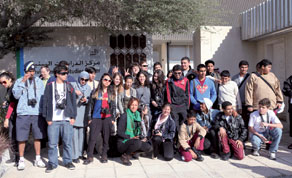 |
| Brazilian and Qatari students pose for a photo during their cross-cultural exploration programme |
Over the past several days, 22 high school students and six teachers from the Qatar Foundation International (QFI)-supported Arabic language and culture programmes in S?o Paulo and Curitiba in Brazil, run by BibliASPA, have been paired with students from the Qatar Leadership Academy and Qatar Academy on an educational exploration in Doha.
QFI partnered with National Geographic to integrate a photo camp and teach digital storytelling during the 10-day exchange trip.
In support of the learning objectives, National Geographic photographers and QFI staff are teaching students how to use photography and video to communicate their ideas and explore their own communities through the camera’s lens.
At the mangroves, the students searched for and photographed important species that make up this essential ecosystem, such as crab, sponges and jellyfish.
The photos taken by the students and National Geographic photographers will be used in partnership with QU’s Environmental Studies Centre to produce an on-line database to document the importance of the mangroves.
The mangroves are a significant component of Qatar’s ecosystem. It represents a sanctuary to migrating birds, food for camels, potential aquaculture sites and mitigates and reduces the impact of sand storms.
There is very little published data on the mangroves and the proposed on-line database will be a useful tool for researchers working on the mangrove in the whole region and be a foundation stone for further work on mangroves.
Before going in to the field, students were introduced to the basics of the mangrove ecosystem in Qatar through a lecture presented by Fadhil Sadooni, Associate Director of QU’s Environmental Studies Center.
The students were guided in the field by Ibrahim Almaslmani who helped them identify the types of organisms living in the mangrove ecosystem.
QU’s Environmental Studies Centre has also partnered with QFI on past student cultural exchanges to provide the students with both experts in the classroom and in the field.
“As part of its natural heritage, Qatar has been investing in restoring, protecting and studying these important ecological areas,” said Maggie Mitchell Salem, executive director of Qatar Foundation International.
“By engaging youth in the efforts to re-establish these mangroves, it connects young people throughout the world to the importance of this national treasure.”

